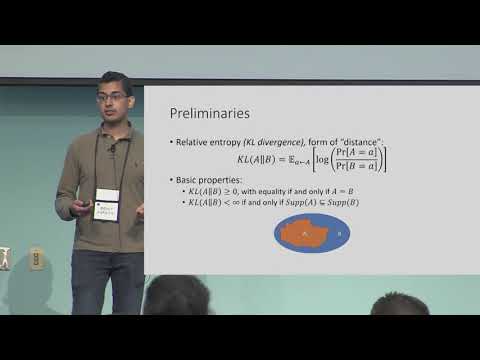CryptoDB
Unifying Computational Entropies via Kullback–Leibler Divergence
| Authors: | |
|---|---|
| Download: |
|
| Abstract: | We introduce hardness in relative entropy, a new notion of hardness for search problems which on the one hand is satisfied by all one-way functions and on the other hand implies both next-block pseudoentropy and inaccessible entropy, two forms of computational entropy used in recent constructions of pseudorandom generators and statistically hiding commitment schemes, respectively. Thus, hardness in relative entropy unifies the latter two notions of computational entropy and sheds light on the apparent “duality” between them. Additionally, it yields a more modular and illuminating proof that one-way functions imply next-block inaccessible entropy, similar in structure to the proof that one-way functions imply next-block pseudoentropy (Vadhan and Zheng, STOC ‘12). |
Video from CRYPTO 2019
BibTeX
@article{crypto-2019-29907,
title={Unifying Computational Entropies via Kullback–Leibler Divergence},
booktitle={Advances in Cryptology – CRYPTO 2019},
series={Lecture Notes in Computer Science},
publisher={Springer},
volume={11693},
pages={831-858},
doi={10.1007/978-3-030-26951-7_28},
author={Rohit Agrawal and Yi-Hsiu Chen and Thibaut Horel and Salil Vadhan},
year=2019
}

